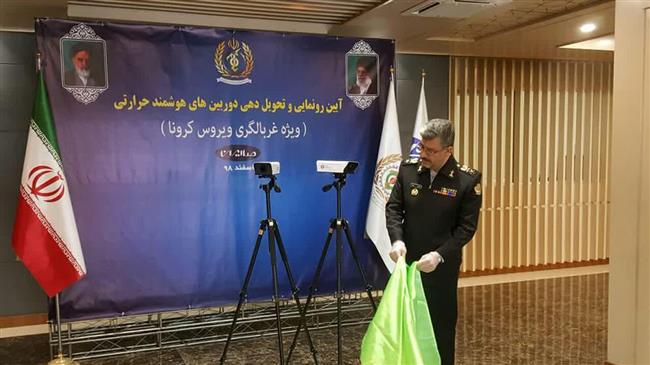“We can produce the machine as much as there is need in the country”, Mohsen Karegar said, adding, “We have succeeded in making the thermo-imaging machine with a group of 5 to 6 people.”
He went on to say, “The first camera was manufactured at the onset of the corona outbreak as the machine gauges the body’s temperature and those who have fever will be identified and separated from others while passing.”
Mohsen Karegar explained that the device’s capability will be used in crowded and densely-commuted places like airports, metro stations and transportation terminals where it is impossible to measure the crowd individually.
Reminding that the first sample of the device was made within 7-10 days after the start of the corona outbreak, Karegar further stated, “It enjoyed the support of the Vice-Presidency for Science and Technology and we have the capacity to produce this thermal camera according to the need of the country.”
He concluded that his company is able to make 100-200 cameras per month but can promote the capacity to meet the need in the country.
The coronavirus COVID-19 is affecting approximately all countries and territories around the world. The virus was first reported in the central Chinese city of Wuhan late last year. It has so far killed more than 34,000 people and infected over 722,000 others globally.

As for Iran, the Iranian health ministry announced on Sunday that 2,901 new cases of infection to COVID-19 virus have been identified in the country, adding that 2,640 patients have died so far.
“According to laboratory results, a sum of 2,901 new cases of infection to COVID-19 virus have been identified in Iran during the past 24 hours, increasing the number of infections to 38, 309,” Health Ministry Spokesman Kianoush Jahanpour said.
He added that fortunately, 12,391 patients infected with COVID-19 virus have also recovered and been discharged from hospital.
Jahanpour said that 123 coronavirus patients have passed away during the past 24 hours, noting that the death toll has increased to 2,640 so far.
The Iranian foreign ministry declared that despite Washington’s claims of cooperation to transfer drugs to Iran via the new Swiss-launched payment mechanism, the US is troubling the process amid the coronavirus outbreak in the country.
Although US claims that medicines and medical equipment are not under sanctions, they have practically blocked the transfer of Iran’s financial resources in other countries into the Swiss Humanitarian Trade Arrangement (SHTA), Iranian Foreign Ministry Spokesman Seyed Abbas Mousavi said.
As the death toll from the virus surges, Iran intensifies its preventive safety measures. Closures of schools and universities have been extended until early April.
The government also imposed travel restrictions, specially on Iran’s North, which is among the red zones. The country has also adopted strict digital health control procedures at airports to spot possible infections.
Health Minister Saeed Namaki announced earlier this month that a new national mobilization plan would be implemented across the country to fight against the coronavirus epidemic and more effectively treat patients.
Namaki said that the plan will include all the 17,000 health centers and the 9,000 medical and clinical centers in all cities, suburban areas and villages.
He added that the plan will include home quarantine, noting that infected people will receive the necessary medicines and advice, but they are asked to stay at home.
Namaki said that people with a more serious condition will stay at the hospitals, adding that the public places will be disinfected, the entries of infected towns and cities will be controlled to diagnose and quarantine the infected cases.
He added that the necessary equipment and facilities have been provided, expressing the hope that the epidemic would be curbed.
According to the latest statistics of Health Ministry, the number of medical laboratories to test coronavirus infection has reached 90 across the country.
The World Health Organization (WHO) says Iran’s response to the virus has so far been up to the mark. Still, it says the US sanctions are a big challenge, and Washington would be complicit in the rising death toll in Iran if it would not remove its sanctions.
The World Health Organization has considered priorities in combating coronavirus and Islamic Republic of Iran obeys and follows up priorities as defined by WHO.
The WHO is dispatching separate delegations to all countries.






